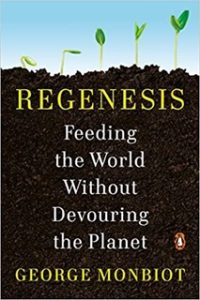Tuesday
UncategorizedRegenesis: Feeding the World Without Devouring the Planet by George Monbiot – A Touching the Earth Collective Book Review
Regenesis: Feeding the World Without
Devouring the Planet
by George Monbiot
A Touching the Earth Collective Book Review
by Gregory Webster
A new book by Guardian columnist and environmental activist George Monbiot is reliably sure to create ripples, and his latest, Regenesis, is no exception. Taking on the task of critiquing the global food system and proposing his own vision for the way forward is no small task and, as always, the book is meticulously researched, with Monbiot claiming to have read over 5,000 research papers in the process.
His story starts in an Orchard in Oxford, where he discovers the incredible richness and complexity of life in the soil. This is Monbiot at his best, being astonished by every exotic micro-creature, from bristletail to symphylid, encountering new categories of life entirely new to his experience.
 The importance of soil health duly conveyed in resplendent detail, Monbiot moves on to examine the dangers and fragilities of the “Global Standard Diet,” now dominated by a small number of corporations in an unhealthily brittle complex system, wide open to compromise and collapse as redundancy and modularity are removed in the name of greater efficiencies. Complex systems, as we know from climate modelling, are open to hitting tipping points beyond which it becomes almost impossible to return to the old status quo. The food supplies we rely on are already showing the warning signs of a complex system destabilizing. Another Code Red for humanity.
The importance of soil health duly conveyed in resplendent detail, Monbiot moves on to examine the dangers and fragilities of the “Global Standard Diet,” now dominated by a small number of corporations in an unhealthily brittle complex system, wide open to compromise and collapse as redundancy and modularity are removed in the name of greater efficiencies. Complex systems, as we know from climate modelling, are open to hitting tipping points beyond which it becomes almost impossible to return to the old status quo. The food supplies we rely on are already showing the warning signs of a complex system destabilizing. Another Code Red for humanity.
Next up in the dock is agricultural sprawl, which has devastated wild ecosystems the world over and continues to destroy them at an alarming rate, as the Global Standard Diet sweeps all before it, not least through the increasing adoption of a meat and dairy diet around the world. We are not spared the full horrors of factory farming, and truly horrific it certainly is. But here Monbiot breaks cover and also turns his attention to organic, free range farming, claiming there “might be no more damaging farm product than pasture fed meat” due to the land footprint required to grow it, with unfavourable resultant pollution rates too.
Monbiot then switches tack and spends time with three agrarian farmers, each working in less impactful ways, building soil health. He is sympathetic to their individual efforts, especially a fruit and veg small holding on an estate in Oxfordshire, England. But he also pulls the rug from under them all to different degrees, and opens up another front in his attack on organic and regenerative farming.
It is time for real solutions, and Monbiot thinks he has them. Rather than pandering to the delusions (as he sees them) of the regenerative farming lobby, Monbiot offers several developments which could help transform our future food system. Perennial crops, which greatly reduce soil disturbance and offer another pathway to greater soil health, sound like a genuinely exciting proposition. But the true game changer in Monbiot’s view is “Farm Free” proteins from soil bacterium brewed in fermentation tanks in factories. This could allow vast tracts of land to be rewilded, as the cruel and brutal farming of animals for meat is consigned to the dustbin of history.
Few would argue with the vision of a world returned to biological abundance and thriving diversity. But many have questioned aspects of Monbiot’s narrative, and his particular interpretation of some of those thousands of reports he read. Monbiot is an absolutist. I’m not sure the world will ever embrace one particular solution to the extent he extrapolates. I would also have liked to see the potential downsides of Farm Free foods explored in more detail (well, more than a paragraph at least); for example, apparently the factory fermentation tanks in which our coming superfoods will be brewed currently require antibiotics to maintain the sterility of the system. I’m not sure replacing antibiotic riven meat with sludge produced in an environment maintained by antibiotics fills me with confidence that the growing antibiotic resistance crisis will be much helped by this development. A vision of new foodstuffs enthusiastically GM modified into exciting new cuisines may sound enticing to some. I just hope the precautionary principle isn’t being thrown out the window in a rush to find this techno-utopia. Another area of concern is the fleeting mentions of indigenous farming cultures. Is the great white, western man going to wipe ancient ways of living off the map yet again in a new age of techno-colonialism?
Some responses to Regenesis have been scathing. Author Paul Kingsnorth, whose essay Quants & The Poets is quoted in the book, has responded to the proposition in his Substack essay The Fourth Revolution:
“Older, crustier greenies like me, labouring under the yoke of a pre-modern sensibility which makes us reluctant to eat the sludge and live in the pod, might feel that something has gone terribly wrong with the numbers-obsessed rationalism that underlies this new, corporate-friendly green technocracy.”
Others, not least actual farmers working to create a regenerative culture on the land, have also presented very different visions of the how the future might look. Since the book’s publication, a Reboot Food manifesto which closely mimics Monbiot’s vision for our food future was published at COP27. The neo-greens are on the march.
Monbiot’s writing can be rightly inspiring. His political commentary is unflinchingly accurate in nailing the systemic failures of our institutions. At times he adopts a deliberately contrarian approach in Regenesis, surely knowing his stated vision is probably actually part of a much richer mosaic of outcomes. This may be his way of moving the dial, undermining the status quo. Wherever you sit in this hotly contested debate, Regenesis is a great way of hearing what the techno-utopians see as the world that’s coming.
+++++
Further reading:
https://www.resilience.org/stories/2022-08-25/monbiotic-man/
Gregory Webster is a Trustee of his local Wildlife Trust (BBOWT), and Chair of ecological consultancy Future Nature WTC. He has practiced in the lineage of Chogyam Trungpa Rinpoche since 2012, sits on the Shambhala Touching the Earth Collective steering committee, and studies Ecodharma with One Earth Sangha. He lives and works in Oxford, England. https://shambhalaonline.org/touching-the-earth/






Nov 30, 2022
Reply
Thanks Greg for such a thorough review of a book I will not have time to read. No easy answers… and appreciate your questioning and not swallowing the protein slush whole.